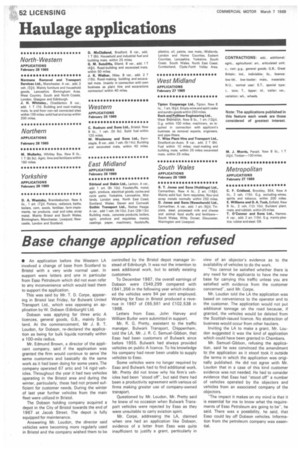Base change application refused
Page 54

If you've noticed an error in this article please click here to report it so we can fix it.
• An application before the Western LA involved a change of base from Scotland to Bristol with a very wide normal user. in support were letters and one in particular from Esso Petroleum which did not even refer to any inconvenience which would lead them to support the application.
This was said by Mr. T. D. Corpe, appearing in Bristol last Friday, for Bulwark United Transport Ltd., which was opposing an application by W. Dobson (Edinburgh) Ltd.
Dobson was applying for three artic A licences, general goods. G.B., mainly Scotland. At the commencement, Mr J. B. T. Loudon, for Dobson, re-declared the application as being for bulk liquids normally within a 100-mile radius.
Mr. Edmund Brown, a director of the applicant company, said if the application was granted the firm would continue to serve'the same customers and basically do the same work as it had been doing for some years. The company operated 67 artic and 14 rigid vehicles. Throughout the year it had two vehicles operating in the Bristol area and during the winter, particularly, these had not proved sufficient for customer needs. During the winter of last year further vehicles from the main fleet were utilized in Bristol.
The Dobson holding company acquired a depot in the City of Bristol towards the end of 1967 at Jacob Street. The depot is fully equipped for maintenance.
Answering Mr. Loudon, the director said vehicles were becoming more regularly used in Bristol and the company wished them to be controlled by the Bristol depot manager instead of Edinburgh. It was not the intention to seek additional work, but to satisfy existing customers.
To December 1967, the overall earnings of Dobson were £549,299 compared with £641,356 in the following year which indicated the vehicles were 94 per cent employed. Working for Esso in Bristol produced a revenue in 1967 of £65,561 and £102,538 in 1968.
Letters from Esso, John Harvey and William Butler were submitted in support.
Mr. R. G. Pretty, assistant to the traffic manager, Bulwark Transport, Chippenham, told the LA, Mr. J. R. C. Samuel-Gibbon, that Esso had been customers of Bulwark since before 1955. Bulwark had always provided vehicles on public A licence. To his knowledge his company had never been unable to supply vehicles to Esso.
Some vehicles were no longer required by Esso and Bulwark had to find additional work. Mr. Pretty did not know why his firm's vehicles had been "stood off", but said there had been a productivity agreement with various oil firms making greater use of company-owned transport.
Questioned by Mr. Loudon, Mr. Pretty said he knew of no occasion when Bulwark Transport vehicles were rejected by Esso as they were unsuitable to carry aviation spirit.
Mr. Corpe, addressing the LA, claimed when one had an application like Dobson, evidence of a letter from Esso was quite insufficient to justify a grant, particularly in view of an objector's evidence as to the availability of vehicles to do the work.
"You cannot be satisfied whether there is any need for the applicants to have the new base for carrying this traffic unless you are satisfied with evidence from the customer concerned", said Mr. Corpe.
Mr. Loudon told the LA the application was based on convenience to the operator and to the customer. The application would not put additional tonnage on the road because, if granted, the vehicles would be deleted from the Scottish-issued licence. No abstraction of business would occur from other hauliers.
Inviting the LA to make a grant, Mr. Loudon suggested it was the kind of application which could have been granted in Chambers.
Mr. Samuel-Gibbon, refusing the application, said he was convinced the amendment to the application as it stood took it outside the terms in which the application was originally published. He did not agree with Mr. Loudon that in a case of this kind customer evidence was not needed. He had to consider evidence that Esso had "stood off" a number of vehicles operated by the objectors and vehicles from an associated company of the objectors.
"The impact it makes on my mind is that it is essential for me to know what the requirements of Esso Petroleum are going to be", he said. There was a possibility, he said, that Esso could lay off Dobson vehicles. Information from the petroleum company was essential.












































































































































































